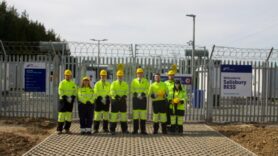Whilst both the UK and many parts of the US bake in steamy temperatures maybe it’s time to look at the impact of weather on energy. Let’s be starkly clear that schemes like the Carbon Reduction Commitment (CRC) completely ignore the impact of weather on kWhrs used by companies who are saddled with the tax.
Traditionally, energy demand peaks occurred in the winter and were largely associated with heating & lighting of buildings – pretty obvious when it’s cold and dark ! As societies become progressively wealthier, even though it may not feel like it, the people within them look to maintain comfort in both their working and domestic environments, they even look for the same on transportation systems.
Here we start to encounter serious conflicts of interest not only in economic but also environmental terms – especially in the Summer when it’s hot!
Let’s take a few examples:
London Underground: Some lines, personally my worst problem is with the deepest lines like the Central, are so over-crowded at the best of times that the inherent temperature of all those sweaty bodies, supplemented by the prevailing external temperature, mean a hell of a lot of heat for those travelling. Solution – air conditioning and supplementary ventilation.
Your office/place of work: Most responsible employers recognise that they need to do everything they can during extreme hot weather to a) ensure their employees turn up for work & b) are at their most productive when there. Solution – air conditioning and supplementary ventilation.
Your home: Unlikely in the extreme to have anything other than opening windows to help reduce your temperature. The elderly in particular are at serious risk of dying when exposed to full solar heat given the inadequacy of UK building standards. Solution – air conditioning and supplementary ventilation.
I think you get the picture….
So what does this mean – if we go ahead and sort the air conditioning/supplementary ventilation needs of the population at large there will be a massive imposition of demand on the country’s generation and distribution system. Assuming of course that we can afford the massive amount of capital expenditure necessary to fund the plant & equipment needed, which is very doubtful given the state of the economy and the average elderly person’s income.
So will we see spikes in energy prices during extreme Summer weather that are totally different from Winter heat price peaks?
Of course we will… what makes things worse is the focus on massive investment in wind generation. Hardly going to make much difference during anti-cyclonic weather conditions such as now.
They won’t be contributing much – in fact today they were contributing a massive 2.4% of the UK’s demand (source – National Grid).
Who knows but this could be where Solar p.v. comes into its own but in fact all other forms of genuine renewables (including Solar p.v.) contributed a mere 1.6%. This on a day when the vast bulk of the UK basks in wall-to-wall sunshine.
Overall conflict is I’m afraid between cost and consumer comfort. Companies who know that cooling is expensive (roughly 5 times as expensive as heating by latest estimates) are more likely, quite rightly in many peoples’ view during pressing financial times, to raise the temperatures in their offices/shops/factories/hotels deliberately to save cost.
Especially when they know they’ll be paying more tax under the CRC for weather which is beyond their control.
I guess it leads to a few very sobering thoughts – if we all installed air conditioning and supplementary ventilation we’d a) cause meltdown of the Grid and b) increase fuel poverty to 100% with current & predicted UK energy prices and last but not least c) what a negative impact on the UK’s carbon position – today’s electricity generation was 34% coal-fired, largely because of the shortfall in wind generation!
Not the most sustainable picture is it?
Mervyn Bowden is the Managing Director of Intuitive Energy Solutions





